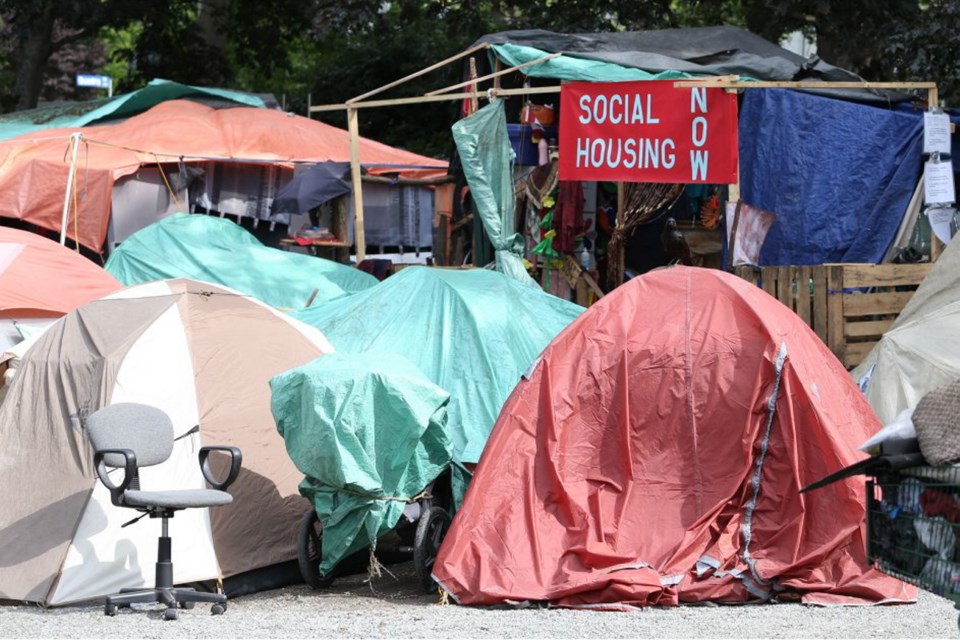 The University of Victoria campus is seven kilometres away from the downtown tent city, but it’s light-years away from the prevailing mood among the camp’s neighbours.
The University of Victoria campus is seven kilometres away from the downtown tent city, but it’s light-years away from the prevailing mood among the camp’s neighbours.
The ranking members of the university’s school of social work and assorted other professors established that pretty clearly with their open letter to Premier Christy Clark.
They said the camp is “visible evidence of the failure of governments to adequately deal with the legacies of colonialism and neoliberalism that governments, including your own, have created.” Neighbours could be forgiven for wanting to talk about issues a bit closer to home than “legacies of colonialism and neoliberalism.” Things like drug use, strangers lurking outside their homes and a new air of anxiety are much further up their priority list.
The 101 professors feel the critical question posed by the tent city is whether government will continue a legacy of criminalization and displacement, or will it see the encampment as a clarion call to action.
The camp has prompted some action over the past several months. There’s no question the $3.6-million purchase of Mount Edwards Court Care Home wouldn’t have happened without the tent city. Neither would the opening of the Youth Custody Centre for the use of homeless people.
Those moves are dismissed as just temporary shelters by the academics, not the permanent housing that’s badly needed. But you have to wonder where the financial limits are when it comes to building the incalculable number of permanent units in B.C. that are apparently needed, given the long-established east-west migration patterns that contribute to the dilemma.
“Tent cities are the product of austerity budgets that have cut social housing spending in Canada; we need to end austerity in order to end tent cities,” says the letter.
The letter calls for 10,000 new units of social housing every year to end homelessness, orders of magnitude more than is now on the books. It would also almost certainly require deficit financing to build and maintain, putting B.C. back in the red again. (Unless they slashed the post-secondary budget and poured it all into housing, instead.)
The academics also include the standard condemnation of the media for its negative coverage, and its potential for inciting public rage toward the homeless and the poor. It “accelerates narratives that serve to stigmatize and criminalize people.”
But the negatives associated with the tent city would be established with or without media coverage. And Victoria media have covered the good with the bad. There have been stories about the original sense of community that tenters tried to build, and Christ Church Cathedral’s valiant efforts to cope with their new neighbours.
The academics are on shaky ground when they dispute that negative impacts even exist.
“Calls to police are evidence of people making calls to police, not evidence of increases in crime,” they say. “To report such statistics about tent city on a public website and not for other places where people mingle (such as shelters or local pubs) is an example of discrimination and social profiling.”
Calls to police are also evidence that taxpaying residents of Victoria, many of them elderly, are fearful of their safety or upset about ongoing side-effects of having more than 100 homeless people set up camp in their neighbourhood. Minimizing that to dispute crime rates (when city police want a $100,000 budget hike to cover the extra costs) is misleading.
The professors state: “Tent cities are necessary spaces for many people to survive the conditions created and perpetuated by colonialism, neoliberalism and austerity policies.”
Compare the UVic letter with the mid-May sermon at Christ Church Cathedral that rekindled the drive to seek another injunction. The church leadership and congregation did their best to show compassion throughout. Then, after a week marked by 16 incidents, which included feces and needles on the lawn, two people shooting up near the school, a naked person in the washroom and a delirious person removed from the grounds, they regretfully concluded that enough is enough.
“Matters that were relatively in hand … seem to have spiralled out of control. It is now a matter of urgency that the tent city be dismantled.”
The church is a lot closer to the problem, and the solution, than the professors are.



